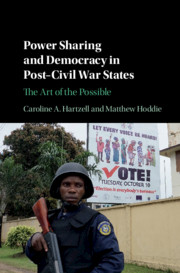Book contents
- Power Sharing and Democracy in Post–Civil War States
- Power Sharing and Democracy in Post–Civil War States
- Copyright page
- Dedication
- Contents
- Figures
- Tables
- Acknowledgments
- Part I From Civil War to Democracy – Introduction and Theory
- 1 Introduction
- 2 Art of the State: Democracy and Power Sharing in Deeply Divided Societies
- 3 State of the Art: Power Sharing, Democracy, and Democratization in Scholarship and Practice
- 4 Art of the Possible: Power Sharing, Democratic Transition, and Democratization in Post–Civil War States
- Part II Evidence
- Part III Conclusion
- Appendix
- References
- Index
2 - Art of the State: Democracy and Power Sharing in Deeply Divided Societies
from Part I - From Civil War to Democracy – Introduction and Theory
Published online by Cambridge University Press: 01 June 2020
- Power Sharing and Democracy in Post–Civil War States
- Power Sharing and Democracy in Post–Civil War States
- Copyright page
- Dedication
- Contents
- Figures
- Tables
- Acknowledgments
- Part I From Civil War to Democracy – Introduction and Theory
- 1 Introduction
- 2 Art of the State: Democracy and Power Sharing in Deeply Divided Societies
- 3 State of the Art: Power Sharing, Democracy, and Democratization in Scholarship and Practice
- 4 Art of the Possible: Power Sharing, Democratic Transition, and Democratization in Post–Civil War States
- Part II Evidence
- Part III Conclusion
- Appendix
- References
- Index
Summary
This chapter assesses the evolving literature on power sharing in the context of deeply divided societies. We note that the earliest studies of power sharing understood these mechanisms as a means of fostering democracy under difficult circumstances. Power sharing was typically thought to be the best hope for preventing fragile democracies, often divided along ethnic lines, from spiraling toward violence, dictatorship, or both. Paradoxically, more recent studies now take these same power-sharing institutions to task for being insufficiently democratic, with the most frequently heard complaint being that these institutions provide a means to block the majority’s will. While acknowledging these concerns, we argue that power sharing remains the most viable means by which a limited form of democracy can be secured in states emerging from conflict. We further consider the literature on the relationship between anocracies and conflict, suggesting that power-sharing settlements are unlikely to foster the creation of regimes that are particularly prone either to internal or external wars.
Keywords
- Type
- Chapter
- Information
- Power Sharing and Democracy in Post-Civil War StatesThe Art of the Possible, pp. 22 - 45Publisher: Cambridge University PressPrint publication year: 2020

